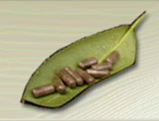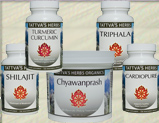 Sanskrit name : Ashwagandha
Sanskrit name : Ashwagandha
Botanical name: Withania Somnifera
Habitat: Ashwagandha is a small shrub that grows to 1.5 meters tall. It is found in dry areas of India and Africa.
Energetics
- Rasa (taste): bitter, astringent, sweet
- Virya (action): heating
- Vipaka (post-digestive effect): sweet
- Doshas (constitutions): Balancing for vata and kapha, may aggravate pitta in excess
Indications: Ashwagandha is sometimes referred to as Indian Ginseng. It has rejuvenative properties that produce energy, which in turn help the body to calm down and sleep.
General information
Thus it helps the body address a stress-related condition rather than masking it with sedatives. Recent research points out that Ashwagandha may be the best herb to take to maintain normal adrenal levels. Many people suffer from adrenal exhaustion and are misdiagnosed with Chronic Fatigue Syndrome or simply leave the doctors office without a clear understanding as to why they constantly feel so exhausted and stressed. Caffeine, nicotine, processed foods and processed sugar all take their toll on the adrenal glands and leave the victim fatigued, depressed and often bewildered as to what to do with themselves. Ashwagandha helps the adrenals recover quickly to a balanced state, assuming the offending habits are discontinued. One of the special properties of Ashwagandha is that it will enhance Ojas. In Sanskrit, Ojas literally means "vigor" and according to Ayurvedic theory, is the most subtle, refined level of the physical body and, in fact, is its essential energy. Ojas is the sap of one's life energy and is the end result of healthy food which is properly digested. It is responsible for a healthy immune system, reproductive processes, physical strength, lustrous complexion, clarity of mind and sense of well-being. It allows consciousness to flow within the body. With decreased ojas, we are less in touch with ourselves and more prone to weakness, fatigue, disease and to experiencing a sense of disharmony
Contraindications
Safe for human and animal use. This herb has been used safely by children in India and even by pregnant women. When taken in small quantities as a tonic. During lactation it increases the flow of mother's milk.
No side effects have been reported with Ashwagandha.
According to Ayurveda herbs are best taken in combination with other herbs or vitamins or minerals in order to neutralize the toxicity of one herb with the opposing effect of other and to enhance the particular effect of one herb with the that of the other.
Reference
- J. Ethnopharmacol 1994 Dec., 44(3):131-5
- A comparative pharmacological investigation of Ashwagandha and Ginseng.
- Grandhi A, Mujumdar AM, Patwardhan B.
- Indian Drugs Research Association, Pune.
Related Ashwagandha Products
Ashwagandha 120 capsules

 Loading... Please wait...
Loading... Please wait...













